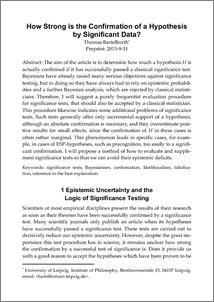Bartelborth, Thomas
(2013)
How Strong is the Confirmation of a Hypothesis by Significant Data?
[Preprint]
![[img]](https://philsci-archive.pitt.edu/style/images/fileicons/application_pdf.png)  Preview |
|
PDF
Bartelborth-significance-tests-preprint1.pdf
- Draft Version
Download (608kB)
|
Abstract
The aim of the article is to determine how much a hypothesis H is actually confirmed if it has successfully passed a classical significance test. Bayesians have already raised many serious objections against significance testing, but in doing so they have always had to rely on epistemic probabilities and a further Bayesian analysis, which are rejected by classical statisticians. Therefore, I will suggest a purely frequentist evaluation procedure for significance tests, that should also be accepted by a classical statistician. This procedure likewise indicates some additional problems of significance tests. Such tests generally offer only incremental support of a hypothesis, although an absolute confirmation is necessary, and they overestimate positive results for small effects, since the confirmation of H in these cases is often rather marginal. This phenomenon leads in specific cases, for example, in cases of ESP-hypotheses, such as precognition, too easily to a significant confirmation. I will propose a method of how to evaluate and supplement significance tests so that we can avoid their epistemic deficits.
Monthly Views for the past 3 years
Monthly Downloads for the past 3 years
Plum Analytics
Actions (login required)
 |
View Item |



